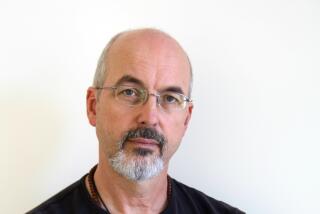A timely message of peace
- Share via
For all its multimedia gadgetry, the Kronos Quartet’s “Visual Music” program, in its world premiere Saturday at UCLA’s Royce Hall, was uncomplicated, direct, heart-on-sleeve. Three of the 10 works played consecutively asserted an antiwar, world-peace message, and a fourth -- though pure music -- rose to the fervor of an anthem.
The theme was sounded early with three movements from Scott Johnson’s “How It Happens (The Voice of I.F. Stone),” written for Kronos. The composer lovingly embeds the words of the well-known political columnist -- spoken on tape by a narrator -- in a serious, but warm and undistracting texture.
For the record:
12:00 a.m. Feb. 20, 2003 For The Record
Los Angeles Times Thursday February 20, 2003 Home Edition Main News Part A Page 2 National Desk 1 inches; 42 words Type of Material: Correction
Kronos Quartet review -- A review of a Kronos Quartet concert that ran in Monday’s Calendar did not clearly identify the narrator heard in Scott Johnson’s “How It Happens (The Voice of I.F. Stone).” It was Stone.
“Nothing in human history is more unholy than holy war,” says the narrator, recounting a murderous conflict that arose between two factions in the early Christian church over a point of doctrine. In this piece, there were only a few images briefly projected onto a screen behind the musicians, including one of a flying plane -- whether bomber or 747 was unclear. The piece ended by inviting the audience to imagine alternatives to war.
The theme continued in an arrangement for Kronos by Stephen Prutsman of Bernard Herrmann’s music for Robert Wise’s 1951 film, “The Day the Earth Stood Still.” No text was needed here; the plot of the Cold War film was told in the program notes. A well-intentioned extraterrestrial arrives to invite humanity to live in peace or face annihilation, but he is shot and wounded by a nervous infantryman. The invitation hangs in the air at the end.
While the MGM Cinemascope musical logo sounded intentionally comically thin when played by the quartet -- violinists David Harrington and John Sherba, violist Hank Dutt and cellist Jennifer Culp -- the rest of the arrangement, played behind the screen so that images of the performing musicians could be projected onto it, was weighty, involving.
“One Earth, One People, One Love” from Terry Riley’s new “Sun Rings,” composed last year for Kronos, announces the topic in its title, a line spoken repeatedly on tape by poet-novelist Alice Walker. The work incorporates imagery from NASA spacecraft and beguiling whistling-like noises from outer space recorded by University of Iowa plasma scientist Dr. Donald Gurnett. But it is Riley’s music, reminiscent of a Baroque saraband, that makes the work solemn and dignified.
“Flugufrelsarinn” (The Free Flyer) by the Icelandic post-rock group Sigur Ros in its original sung version is a parable of salvation and sacrifice.
That sense carried over in Prutsman’s arrangement for Kronos, which closed the program with a sense of inspiration and hope, although the final quiet measures left the future ambiguous.
Other works included Steve Reich’s ingenious “Pendulum Music,” Mark Grey’s mystical “Bertoia I and II,” Conlon Nancarrow’s hot “Boogie Woogie #3A,” John Zorn’s never-to-be-pinned down “Cat O’Nine Tails,” and Penderecki’s engrossing “Quartetto per archi,” played as the projected score flowed across the screen. For all their interest, it was the other thematic works that carried the most import.
More to Read
The biggest entertainment stories
Get our big stories about Hollywood, film, television, music, arts, culture and more right in your inbox as soon as they publish.
You may occasionally receive promotional content from the Los Angeles Times.










